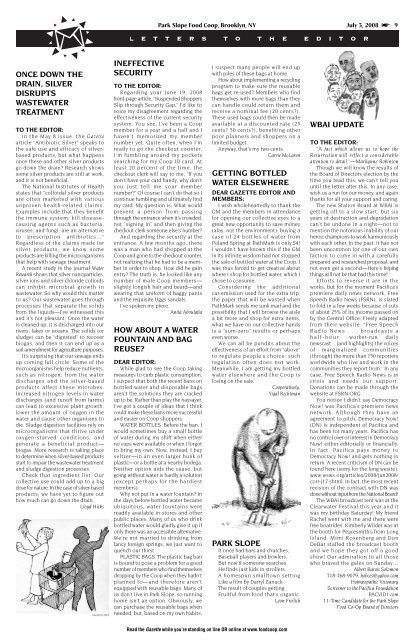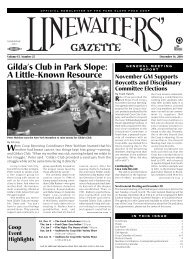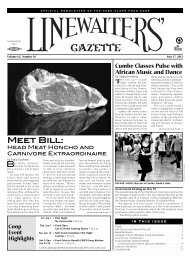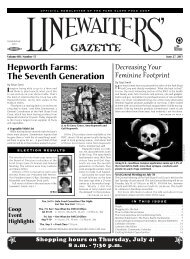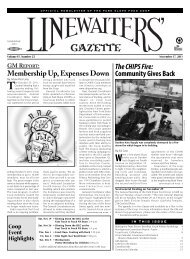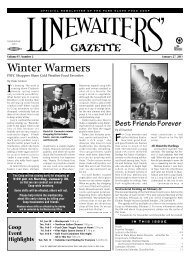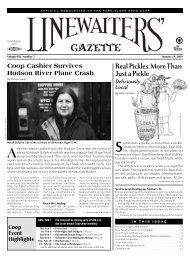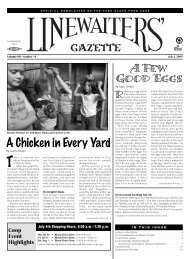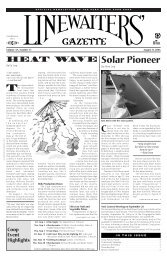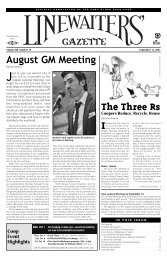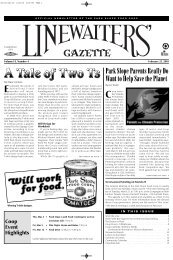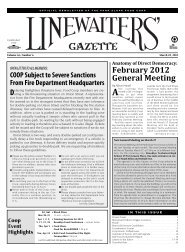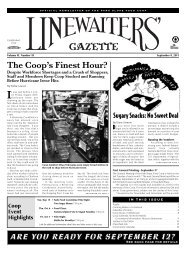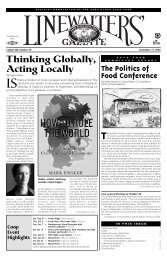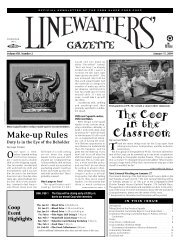Household Dharma - Park Slope Food Coop
Household Dharma - Park Slope Food Coop
Household Dharma - Park Slope Food Coop
Create successful ePaper yourself
Turn your PDF publications into a flip-book with our unique Google optimized e-Paper software.
<strong>Park</strong> <strong>Slope</strong> <strong>Food</strong> <strong>Coop</strong>, Brooklyn, NY July 3, 2008 9<br />
ONCE DOWN THE<br />
DRAIN, SILVER<br />
DISRUPTS<br />
WASTEWATER<br />
TREATMENT<br />
TO THE EDITOR:<br />
In the May 8 issue, the Gazette<br />
article “Antibiotic Silver” speaks to<br />
the safe use and efficacy of silverbased<br />
products, but what happens<br />
once these and other silver products<br />
go down the drain Research shows<br />
some silver products are still at work,<br />
and it is not beneficial.<br />
The National Institutes of Health<br />
states that “colloidal silver products<br />
are often marketed with various<br />
unproven health-related claims.<br />
Examples include that they benefit<br />
the immune system; kill diseasecausing<br />
agents such as bacteria,<br />
viruses, and fungi; are an alternative<br />
to prescription antibiotics…”<br />
Regardless of the claims made for<br />
silver products, we know some<br />
products are killing the microorganisms<br />
that help with sewage treatment.<br />
A recent study in the journal Water<br />
Research shows that silver nanoparticles,<br />
silver ions and silver chloride colloids<br />
can inhibit microbial growth in<br />
wastewater. So why would this matter<br />
to us Our wastewater goes through<br />
processes that separate the solids<br />
from the liquids—I’ve witnessed this<br />
and it’s not pleasant. Once the water<br />
is cleaned up, it is discharged into our<br />
rivers, lakes or oceans. The solids (or<br />
sludge) can be “digested” to recover<br />
biogas, and then it can end up as a<br />
soil amendment for agriculture purposes.<br />
It’s surprising that our sewage ends<br />
up coming full circle. Some of the<br />
microorganisms help reduce nutrients,<br />
such as nitrogen, from the water<br />
discharges and the silver-based<br />
products affect these microbes.<br />
Increased nitrogen levels in water<br />
discharges (and runoff from farms)<br />
can lead to excessive plant growth,<br />
lower the amount of oxygen in the<br />
water and cause other organisms to<br />
die. Sludge digestion facilities rely on<br />
microorganisms that thrive under<br />
oxygen-starved conditions, and<br />
generate a beneficial product—<br />
biogas. More research is taking place<br />
to determine when silver-based products<br />
start to impair the wastewater treatment<br />
and sludge digestion processes.<br />
Check that ingredient list. Our<br />
collective use could add up to a big<br />
dose for nature. In the case of silver-based<br />
products, we have yet to figure out<br />
how much can go down the drain.<br />
Lloyd Hicks<br />
INEFFECTIVE<br />
SECURITY<br />
TO THE EDITOR:<br />
Regarding your June 19, 2008<br />
front-page article, “Suspended Shoppers<br />
Slip through Security Gap,” I’d like to<br />
voice my disagreement regarding the<br />
effectiveness of the current security<br />
system. You see, I’ve been a <strong>Coop</strong><br />
member for a year and a half and I<br />
haven’t memorized my member<br />
number yet. Quite often, when I’m<br />
ready to go the checkout counter,<br />
I’m fumbling around my pockets<br />
searching for my <strong>Coop</strong> ID card. At<br />
least 20 percent of the time, the<br />
checkout clerk will say to me, “If you<br />
don’t have your card handy, why don’t<br />
you just tell me your member<br />
number” Of course I can’t do that so I<br />
continue fumbling and ultimately find<br />
my card. My question is: What would<br />
prevent a person from passing<br />
through the entrance when it’s crowded,<br />
not “signing in” and then giving the<br />
checkout clerk someone else’s number<br />
And regarding the security at the<br />
entrance: A few months ago, there<br />
was a man who had shopped at the<br />
<strong>Coop</strong> and gone to the checkout counter,<br />
not realizing that he had to be a member<br />
in order to shop. How did he gain<br />
entry The truth is, he looked like any<br />
number of male <strong>Coop</strong> members—<br />
slightly longish hair and beard—and<br />
wearing that uniform of baggy pants<br />
and the requisite Uggs sandals.<br />
I’ve spoken my piece.<br />
Anita Aboulafia<br />
HOW ABOUT A WATER<br />
FOUNTAIN AND BAG<br />
REUSE<br />
DEAR EDITOR:<br />
While glad to see the <strong>Coop</strong> taking<br />
measures to curb plastic consumption,<br />
I suspect that both the recent bans on<br />
bottled water and disposable bags<br />
aren’t the solutions they are cracked<br />
up to be. Rather than play the naysayer,<br />
I’ve got a couple of ideas that I think<br />
could make these bans more successful<br />
and easier on <strong>Coop</strong> shoppers.<br />
WATER BOTTLES. Before the ban, I<br />
would sometimes buy a small bottle<br />
of water during my shift when either<br />
no cups were available or when I forgot<br />
to bring my own. Now, instead, I buy<br />
seltzer—in an even larger hunk of<br />
plastic—or a bottle at a nearby bodega.<br />
Neither option aids the cause, but<br />
going without water is hardly a solution<br />
(except perhaps for the hardiest<br />
members).<br />
Why not put in a water fountain In<br />
the days before bottled water became<br />
ubiquitous, water fountains were<br />
readily available in stores and other<br />
public places. Many of us who drink<br />
bottled water would gladly give it up if<br />
only there was an accessible alternative.<br />
We’re not married to drinking from<br />
fancy foreign springs, we just want to<br />
quench our thirst.<br />
PLASTIC BAGS. The plastic bag ban<br />
is bound to pose a problem for a good<br />
number of members who find themselves<br />
dropping by the <strong>Coop</strong> when they hadn’t<br />
planned to—and therefore aren’t<br />
equipped with reusable bags. Many of<br />
us don’t live in <strong>Park</strong> <strong>Slope</strong>, so running<br />
home isn’t an option. Obviously, we<br />
can purchase the reusable bags when<br />
needed, but, based on my own habits,<br />
I suspect many people will end up<br />
with piles of these bags at home.<br />
How about implementing a recycling<br />
program to make sure the reusable<br />
bags get re-used Members who find<br />
themselves with more bags than they<br />
can handle could return them and<br />
receive a nominal fee (20 cents).<br />
These used bags could then be made<br />
available at a discounted rate (25<br />
cents 50 cents), benefiting other<br />
poor planners and shoppers on a<br />
limited budget.<br />
Anyway, that’s my two cents.<br />
Carrie McLaren<br />
GETTING BOTTLED<br />
WATER ELSEWHERE<br />
DEAR GAZETTE EDITOR AND<br />
MEMBERS:<br />
I wish wholeheartedly to thank the<br />
GM and the members in attendance<br />
for opening our collective eyes to a<br />
great new opportunity to save money<br />
(alas, not the environment): buying a<br />
case of 24 bottles of water from<br />
Poland Spring at PathMark is only $4!<br />
I wouldn’t have known this if the GM<br />
in its infinite wisdom had not stopped<br />
the sale of bottled water at the <strong>Coop</strong>. I<br />
was thus forced to get creative about<br />
where I shop for bottled water, which I<br />
chose to consume.<br />
Considering the additional<br />
car-emission used for the extra trip,<br />
the paper that will be wasted when<br />
PathMark sends me junk mail and the<br />
possibility that I will browse the aisle<br />
a bit more and shop for extra items,<br />
what we have on our collective hands<br />
is a “sum-zero” results or perhaps<br />
even worse.<br />
We can all be pundits about the<br />
effectiveness of an effort from “above”<br />
to regulate people’s choice: such<br />
regulation often does not work.<br />
Meanwhile, I am getting my bottled<br />
water elsewhere and the <strong>Coop</strong> is<br />
losing on the sale.<br />
<strong>Coop</strong>eratively,<br />
Yigal Rechtman<br />
PARK SLOPE<br />
It once had bars and churches,<br />
Baseball players and bowlers,<br />
But now if someone searches<br />
He finds just kids in strollers.<br />
A homespun smalltown setting<br />
Like a film by Darryl Zanuck<br />
The result of couples getting<br />
Fruitful from food that’s organic.<br />
Leon Freilich<br />
WBAI UPDATE<br />
TO THE EDITOR:<br />
“A fact which allows us to hope the<br />
Resurrection will reflect a considerable<br />
attention to detail.”—Marilynne Robinson<br />
Though we will know the results of<br />
the Board of Directors election by the<br />
time you read this, we can’t tell you<br />
until the letter after this. In any case,<br />
wish us a run for our money, and again<br />
thanks for all your support and caring.<br />
The new Station Board at WBAI is<br />
getting off to a slow start, but six<br />
years of destruction and degradation<br />
can’t be undone in a night—not to<br />
mention the notorious inability of our<br />
heroic champions to work harmoniously<br />
with each other. In the past, it has not<br />
been uncommon for one of our own<br />
faction to come in with a carefully<br />
prepared and researched proposal, and<br />
not even get a second—Here’s hoping<br />
things will not be that bad this time!<br />
Efforts to reverse it are in the<br />
works, but for the moment Pacifica’s<br />
premiere daily news network, Free<br />
Speech Radio News (FSRN), is slated<br />
to fold in a few weeks because of cuts<br />
of about 25% of its income passed on<br />
by the Central Office. Freely adapted<br />
from their website: “Free Speech<br />
Radio News . . . broadcasts a<br />
half-hour, worker-run daily<br />
newscast…[and highlights] the voices<br />
of marginalized communities<br />
[through] the more than 150 reporters<br />
worldwide who live and work in the<br />
communities they report from.” In any<br />
case, Free Speech Radio News is in<br />
crisis and needs our support.<br />
Donations can be made through the<br />
website at FSRN.ORG.<br />
You notice I didn’t say Democracy<br />
Now! was Pacifica’s premiere news<br />
network. Although they have an<br />
agreement to pitch, Democracy Now!<br />
(DN) is independent of Pacifica and<br />
has been for many years. Pacifica has<br />
no control over or interest in Democracy<br />
Now! either editorially or financially.<br />
In fact, Pacifica pays money to<br />
Democracy Now! and gets nothing in<br />
return. A recent criticism of DN can be<br />
found here (sorry for the long wesite):<br />
www.wsws.org/articles/2008/jun2008/<br />
corr-j17.shtml. In fact, the most recent<br />
revision of the contract with DN was<br />
done without input from the National Board!<br />
The WBAI broadcast tent was at the<br />
Clearwater Festival this year and it<br />
was my birthday Saturday! My friend<br />
Rachel went with me and there were<br />
free boatrides. Kimberly Wilder was at<br />
the booth for Peacesmith’s from Long<br />
Island. Mimi Rosenberg and Don<br />
DeBar staffed the broadcast booth<br />
and we hope they got off a good<br />
show! Our admiration to all those<br />
who braved the gales on Sunday…<br />
Albert Baron Solomon<br />
718-768-9079, hobces@yahoo.com<br />
Homœopathic Visionary<br />
Scrivener to the Pacifica Foundation<br />
PACVID1.com<br />
11-Time Candidate for the <strong>Park</strong> <strong>Slope</strong><br />
<strong>Food</strong> Co-Op Board of Directors<br />
Read the Gazette while you’re standing on line OR online at www.foodcoop.com


